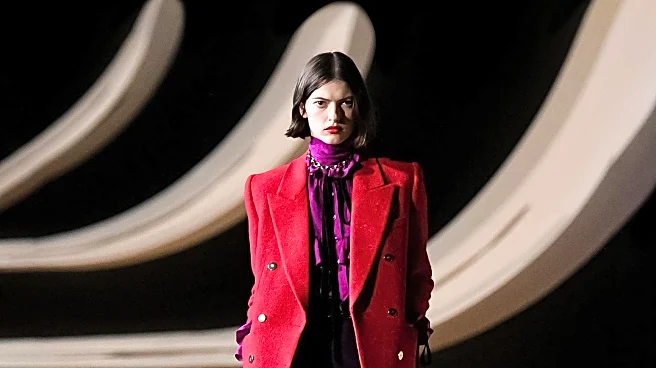What's Happening?
Recent fashion shows in Paris have highlighted the creative innovations of designers such as Alessandro Michele, Miuccia Prada, and Nadège Vanhée. Michele's collection, titled 'Fireflies,' reflects a deep engagement with political themes, inspired by Pier Paolo Pasolini's writings. His designs feature gilded fabrics and dramatic statements, aiming to connect fashion with broader societal issues. Prada's Miu Miu show focused on the theme of women's work, using aprons as a symbol to express the challenges and efforts of female laborers. Vanhée's Hermès collection incorporated bohemian and gypsy influences, showcasing luxurious leather designs. These shows demonstrate a blend of artistic expression and social commentary, with designers using fashion as a platform to address contemporary issues.
Why It's Important?
The integration of political and social themes into fashion collections signifies a shift in the industry towards more meaningful and reflective designs. By addressing topics such as women's work and political defiance, designers are not only pushing creative boundaries but also engaging with cultural and societal conversations. This approach can influence public perception and consumer behavior, encouraging a more conscious and informed engagement with fashion. Additionally, the focus on sustainable practices and innovative materials highlights the industry's response to environmental concerns, potentially setting new standards for ethical fashion production.
What's Next?
As designers continue to explore the intersection of fashion and social issues, we can expect further collaborations and initiatives that promote sustainability and cultural awareness. The success of these shows may inspire other designers to incorporate similar themes, leading to a broader movement within the industry. Stakeholders such as fashion brands, consumers, and advocacy groups may respond by supporting collections that align with ethical and political values. This trend could also influence future fashion weeks, with designers prioritizing storytelling and impact over traditional aesthetics.
Beyond the Headlines
The emphasis on political and social themes in fashion raises questions about the role of designers as cultural commentators. This development challenges the traditional view of fashion as purely aesthetic, positioning it as a medium for dialogue and change. Ethical considerations, such as the portrayal of labor and the use of sustainable materials, may become central to fashion discourse. Long-term, this could lead to a reevaluation of consumer values and the industry's impact on society, fostering a more responsible and engaged fashion community.










